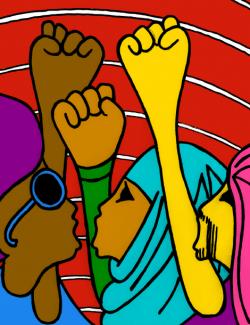Understanding the Aid Effectiveness Agenda Primers
The Paris Declaration on Aid Effectiveness is the most recent agreement by donor and recipient countries to reform the delivery and management of aid monies in order to strengthen its impact and effectiveness. The Aid Effectiveness and Women’s Rights Series Primers shares information, analysis and proposals needed to support women’s right activists in contributing to a comprehensive, balanced, and inclusive approach to reforming aid so that it reaches the people who need it most.
This aid effectiveness agenda, the result of the signature and implementation of the Paris Declaration process currently determines how and to whom aid is being delivered as well as how donor and aid-recipient countries are relating to one another. We hope the information, analysis and proposals included in these primers will encourage women's rights advocates and other actors to understand the relevance of this process and to engage in it to support the call for a more comprehensive, balanced, and inclusive approach to reforming aid so that it reaches the people who need it most, including women!
Primer 1: An Overview of the Paris Declaration on Aid Effectiveness and the new Aid Modalities
In 2005 civil society organizations bore witness to the signing of the Paris Declaration on Aid Effectiveness (PD)—history’s most recent agreement by donor and recipient countries to reform the delivery and management of aid monies in order to strengthen its impact and effectiveness.
Read online
Primer 2: Key Official Bodies Related to the Implementation of the Paris Declaration
The OECD has put in place a number of official mechanisms to track the implementation of the Paris Declaration. This 2nd primer in the series Understanding the Aid Effectiveness Agenda is devoted to outlining and clarifying the roles of these groups in the lead up to the High Level Forum (HLF3) taking place in Accra, Ghana.
Read Online
Primer 3: Civil Society’s Engagement in the Aid Effectiveness Agenda: The Parallel Process, Key Concerns and Recommendations
This third primer in the series focuses on describing how the parallel tracking process is being undertaken independently by CSOs and, most recently, CSOs of all shapes and sizes have been calling for reforms to the tracking, delivering, and management of aid for quite some time and have become much more vocal about some of the CS concerns since the signing of the Paris Declaration in 2005.
Read Online
Primer 4: Monitoring and Evaluation of the Paris Declaration Implementation
This primer presents a general overview of this process, the key results of the first official round of monitoring, and the main concerns and recommendations put forward by CSOs participating in the parallel process towards the HLF3
Read Online
Primer 5: Making Women’s Rights and Gender Equality a Priority in the Aid Effectiveness Agenda
This primer presents highlights from a research piece recently developed by AWID and WIDE called Implementing the Paris Declaration: Implications for the Promotion of Women’s Rights and Gender Equality; and the main recommendations from the International Consultation of Women’s Organizations and Networks and Aid Effectiveness organized by AWID, WIDE and UNIFEM in Ottawa (January-February 2008).
Read Online
Primer 6: Women’s organizations proposals to influence the 3rd High Level Forum debates in Accra
This Primer explains the advocacy efforts of women’s organizations and CSOs in the lead up to the HLF-3.
Read Online
Primer 7: Gender equality and Aid Effectiveness: regional perspectives in the preparation process towards Accra
This Primer provides an overview of both the official OECD regional meetings and the women’s consultations, with specific focus on the key regional messages that emerged on aid effectiveness, the principles of the Paris Declaration and the Accra Agenda for Action (AAA). The composition of the meetings and the extent to which gender equality and women’s empowerment were taken into account is highlighted, as well.
Read Online
Primer 8: The Accra Agenda for Action: A brief review from a women’s rights perspective
Primer 8 provides an overview of the Organization for Economic Cooperation and Development (OECD) 3rd High Level Forum on Aid Effectiveness held in Accra in 2008 as well as an analysis - from a gender equality and women’s rights perspective - of its outcome document: the Accra Agenda for Action (AAA).
Read Online
Primer 9: The Road to Korea 2011: Key official and civil society actors
Primer 9 provides an overview of key official and civil society actors involved in the monitoring of the Paris Declaration on Aid Effectiveness and the preparations towards the 4th High Level Forum on Aid Effectiveness, to take place in Busan, South Korea, in November 2011.
Read Online
Primer 10: On The Road To Busan: What Is At Stake For Gender Equality And Women’s Rights?
Primer 10 highlights what is at stake for gender equality and women’s rights at this Fora and sets out plans for gender advocates and CSO mobilizations.
Read Online
Primer 11: A Feminist Perspective on the Busan 4th High Level Forum on Aid Effectiveness and its Outcomes
Primer 11 reviews the renewed development cooperation framework which emerged from the 4th High Level Forum on Aid Effectiveness, Busan 2011. This primer provides a critical assessment of the gains and setbacks for women’s rights by providing a comparative analysis between the Women’s Key Demands for Busan and the final official outcomes as agreed in the Global Partnership for Effective Development Cooperation.
Read Online
Primer 12: The United Nations Development Cooperation Forum Through a Women's Rights Lens
Primer 12 provides an overview of the UN Development Cooperation Forum (DCF). It focuses in on the DCF origins and strategic plans for the future, while emphasizing the importance of the DCF for women's rights and gender equality advocates.
Read online
